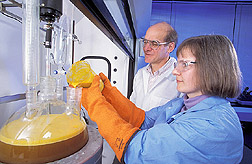This page has been archived and is being provided for reference purposes only. The page is no longer being updated, and therefore, links on the page may be invalid.
|
Read the magazine story to find out more. |
Biofuel Gets Less ExpensiveBy Jim CoreApril 16, 2002 Biodiesel is traditionally made from agricultural lipids such as fats and oils. These highly refined edible oils are renewable resources that reduce air-polluting emissions from diesel engines. Now, scientists at the Agricultural Research Service have developed a biodiesel fuel produced from soybean soapstock, an abundant but underutilized byproduct of vegetable oil refining. The new biodiesel’s composition, engine performance and emissions are comparable to those of biodiesel fuels now on the market. Scientists at the ARS Eastern Regional Research Center in Wyndmoor, Pa., have studied the use of lower-value lipids from animal fats, vegetable oils and recycled greases as raw materials for biodiesel production. ARS research chemist Michael J. Haas and biologist Karen M. Scott teamed with Scott Bloomer, then at Cargill in Minneapolis, Minn., to develop a chemical method that converts all forms of fatty acids found in the lipids of soybean soapstock into simple methyl esters, a compound in biodiesel fuel. The researchers were recently granted a patent for the process. Many commercially available biodiesel fuels are made from refined soy oil and added to diesel, typically at levels of 20 percent of the mixture’s volume. According to Haas, studies show that biodiesel, used alone or in such blends, can provide much-needed lubrication to fuel systems, while also reducing the production of polluting exhaust emissions. Now Haas, Scott and Bloomer have modified the technology to allow the use of lower-value, less-pure lipids, such as soapstock, as starting materials. Soybean oil soapstock is a plentiful and relatively inexpensive byproduct of edible oil refining. About 100 million pounds of the soapstock are produced in the United States every year, and it can cost as little as one-tenth or less of the price of refined vegetable oil. Currently, it is used mostly as a cheap source of fat in livestock feeds. However, by implementing processes such as that developed by Haas and Bloomer, the agents in soapstock could one day serve as the source of diesel engine fuel or fuel additives and in other applications such as cleaning agents and organic solvents. More information can be found in the April 2002 issue of Agricultural Research magazine. ARS is the U.S. Department of Agriculture’s chief scientific research agency. |

